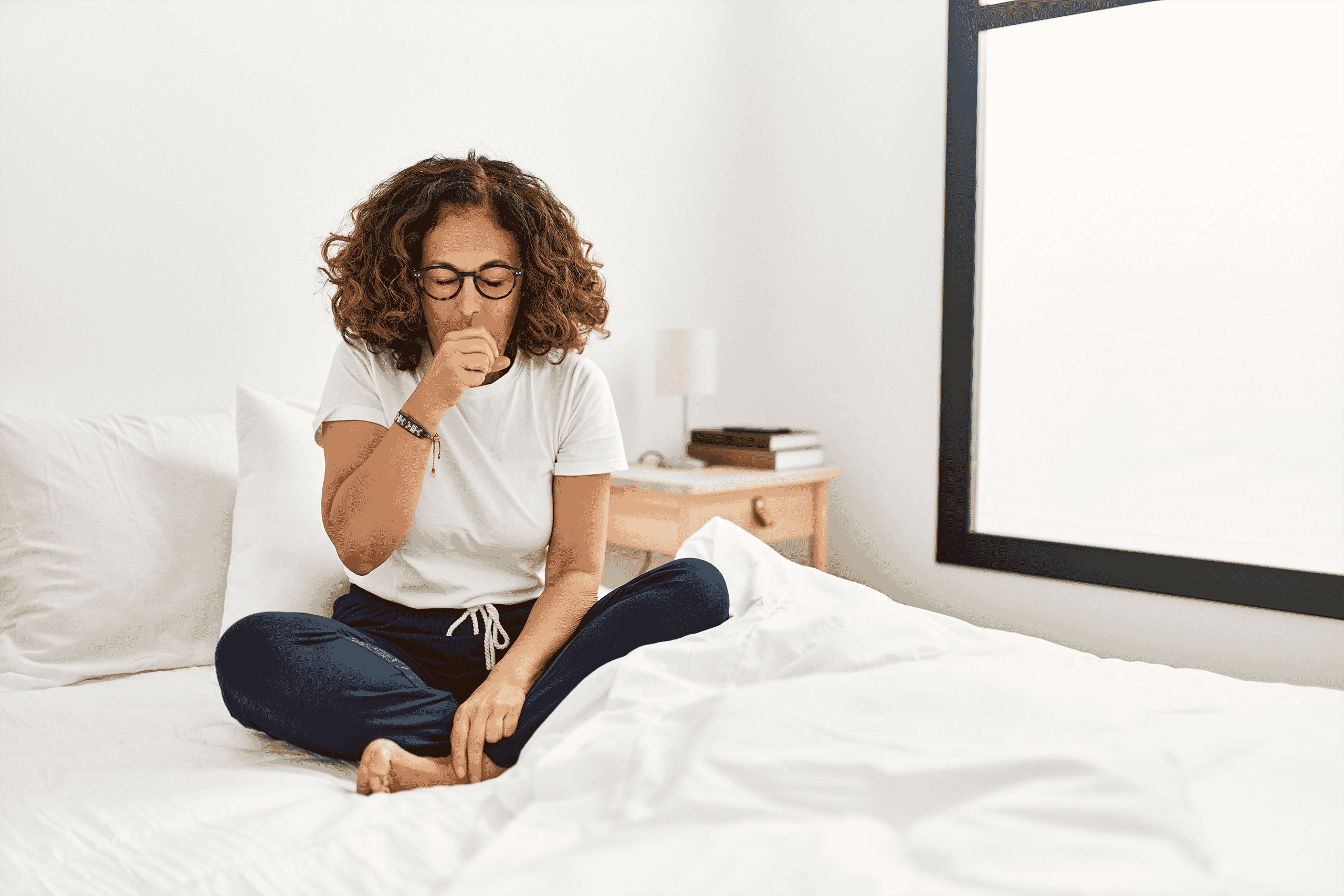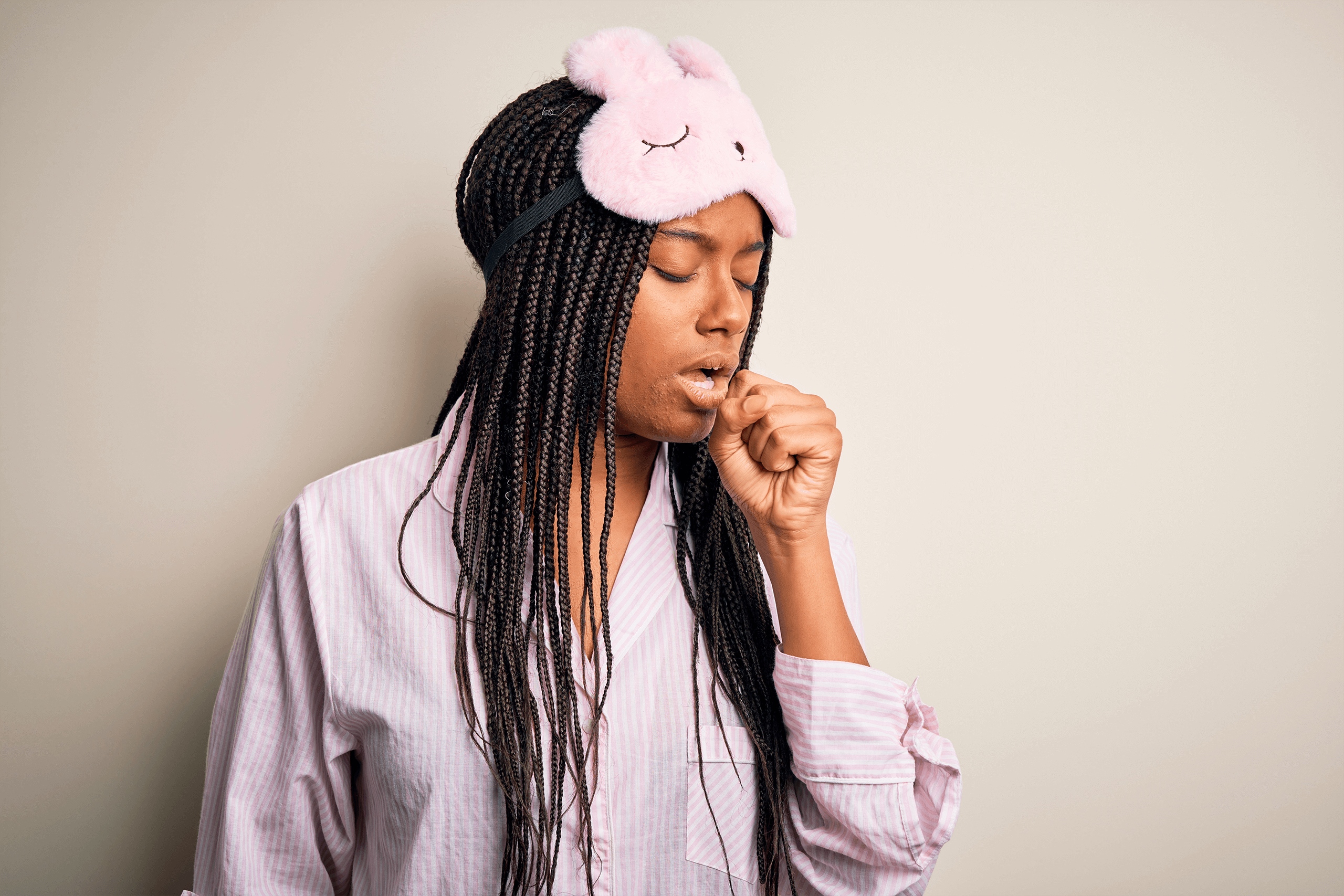When cold and flu season hits, many of us find ourselves struggling to get enough sleep at night as we cough and splutter through to morning. Over 40% of people report that sleeping more than normal helps them deal with a cold, but it’s natural to have trouble sleeping when you have a cold, or when sleeping with a blocked nose.
We know from our guide on the benefits of a good night’s sleep that it can make a world of difference for you. This lack of sleep can often leave us feeling even worse the next day since we haven’t had enough rest to let our bodies recover and fight the infection, so getting a good night’s sleep when you have a cough is crucial!
In this blog, we'll explain why a cough can feel worse at night and provide our top tips on the best sleeping positions, as well as other general tips on how to get to sleep when you've got a cough. From consuming honey to using a humidifier, you might find some helpful advice that you wouldn’t have otherwise considered!

Sleeping with a cough – why is it so hard?
We naturally cough to protect our windpipe, voice box, and lungs from mucus and foreign objects. When you’re sick, you might find that your cough gets worse at night, and this is because of postnasal drip. Postnasal drip is the fancy name for the secretions that run down the back of your throat from your nose instead of coming out as snot. Lying on your back can make postnasal drip much worse, with gravity playing a big part in where the drips end up, so you might notice worse coughing at night because of this.
What is the best position to sleep in with a cough?
One way to combat this is to keep your head elevated at night. This helps to relieve sinus pressure and make sure the postnasal drip doesn’t get too bad. Lying on your back and using an extra pillow to prop up your head will help a lot, or raising the actual head end of the bed itself with an adjustable bed. Lying on your stomach is another way to provide temporary relief from coughing because it encourages more effective drainage of mucus from your airways.
How to stop a cough at night
It can be much harder to get to sleep at night when you have a cough- and to stay asleep too – so finding techniques that help to keep the coughing at bay can be a lifesaver. Here are a few strategies you can try to ease your cough at nighttime:
Try cough medicine
This is definitely the most obvious answer on our list of helpful advice, but using cough medicine or even just taking cold and flu medicine will help ease the symptoms of your cough. All these medicines contain ingredients that are designed to ease the tickling or scratching in your throat that initiates the need to cough, reduce the mucus present and generally take away the discomfort you feel. If you have a dry cough, then you might find that a cough lozenge is enough to help calm your cough reflexes enough to fall asleep, but make sure you've finished the lozenge before sleeping to avoid choking.
Try a nasal decongestant
Alongside cough medicine, taking a nasal decongestant can help to alleviate some of the build-up of postnasal drip that affects you while you sleep. Nasal decongestants contain substances that target the blood vessels to open up the nasal passages and are available over the counter in the form of tablets, drops, or nasal sprays. It’s worth noting that children younger than six years old should not be using these products.
Drink a warm liquid
There are plenty of home remedies and old wives’ tales that involve drinking something warm to help relieve your cold symptoms, and there is some scientific evidence that this really does work! The warmth from the hot liquids helps to make you feel warmer and reduces the strain on your throat, relaxing the muscles there. Whilst it’s not scientifically proven it can help you breathe better through your nose, if it makes you feel better then it’s worth giving it a go!
Elevate your head and neck
As we mentioned above, keeping your head and neck elevated will help to reduce that postnasal drip that causes so much bother, and it will help you to sleep better if you’re not being woken up frequently with coughing and sniffling. This elevation can also help with snoring while you’re unwell, which can provide some much-needed respite for anyone you share a bed or bedroom with.
Try having some honey
This is a great solution for children suffering from a cough, especially since over-the-counter cold and flu medicine poses more of a risk to them. This sweet alternative has antiviral and antibacterial effects too, making it a great superfood to have when you’re feeling under the weather. The honey helps to reduce coughing at night by reducing mucus secretion and increasing cytokine release which has antimicrobial effects.
Use a humidifier
We’ve all felt the amazing effects of having a shower or steam when we’ve got a cold, the steam clearing your nasal passages with ease. Using a humidifier at night is another great way to increase humidity levels in your bedroom to last the whole night and help clear your airways. Keeping humidity levels above 40% also makes the influenza virus less infectious which may help protect others in your household.

Sleeping with a cough can be really frustrating, but using some of these strategies might take the edge off enough for you to get some good rest. We know that taking time off work can improve your sleep, but it’s also good to take a break when you feel unwell too! Check out our Snooze News section for more health and lifestyle guides to ease your night’s sleep.









